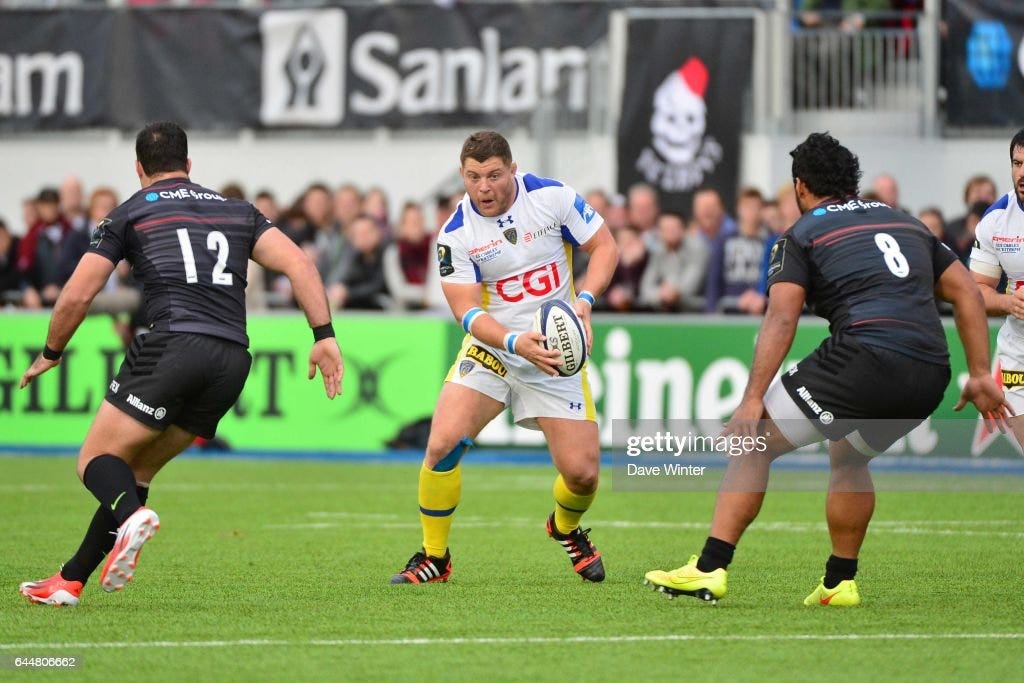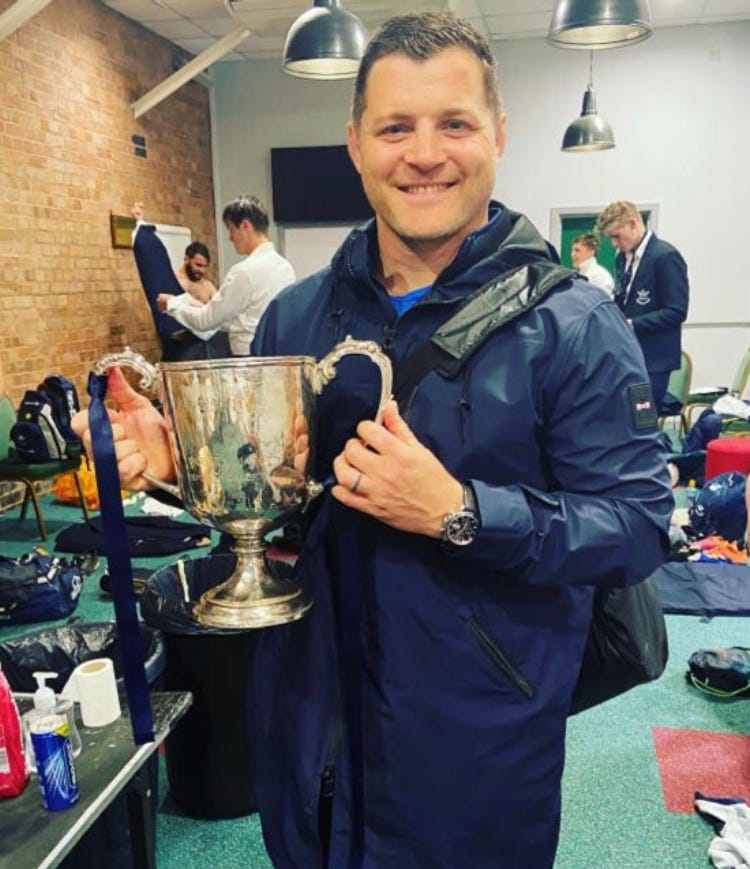#5 - Benjamin Kayser
Former international rugby player (France, Leicester Tigers, Clermont Auvergne et al)
Benjamin Kayser is a former international rugby player, who played his last game in June 2019. He’s always been fascinated by entrepreneurship and team chemistry. To feel more legitimate in the world of business, he decided to do an Executive MBA at Saïd Business School, University of Oxford, whilst doing some leadership development consultancy and media work. This transformative journey led him to co-found Teampact Ventures, an impact VC Fund which takes sport’s gold (elite athletes mental strength and best practices to create sustainably performing teams) to bring to the start-ups we invest in, to impact the world positively.

If you hadn’t been an athlete, what would you have gone into after school or university? And why?
Sport has always been an important way of expressing myself and feeding my competitive edge but I never wanted it to define me, neither did I plan for rugby to take such a big place in my professional career. So I would say that I would have gone to business school, probably abroad and would have hopefully launched my own business, with a strong mix of personal expertise and purpose.
What experience or memory do you cherish most from your days of being a professional athlete?
The changing room 5 mins before going out to battle, and 5 mins after the game, I cherish those incredible collective emotions. Winning titles and international games of course, the sound of giant crowds on big hits or amazing tries, of course. I cherish having witnessed incredibly charismatic leaders take a team through adversity, I have always been fascinated by elite performers mental strengths and elite teams’ capacity to create a winning culture. It’s one thing to read it in a book, it’s completely different to feel it and be part of it. I was extremely lucky to be in the second scenario, so I will always cherish those memories.
The second isn’t one memory but the general lifestyle which I was lucky enough to experience. Training for Heptathlon is so brutal. You spend 5+ days a week training 4-5 hours a day (if not more!) and I was lucky enough that my training partners were some of my best friends. We’ve trained in the torrential rain and snow, we’ve seen each other grumpy, injured and broken. We’ve died on the track countless times and ridden the highs and lows of sport together. I’m so grateful for the crazy intensity of the experiences we had together. It taught me so much about friendship as well as my own capacity to cope with whatever is thrown at me. I’ve become so resilient and aware of my own strength because of sport
What’s one thing you’re interested in or care about that most people don’t know?
I believe sport and elite athletes must lead the way to break the stigma around mental health, and truly believe technology has a central role to play. I am also a huge Elvis Presley fan, he is my karaoke go to…
The prevalence of mental health problems in elite sport is incredibly high. Why do you think that is and how can we reduce it?
First the why.
It is all in the word elite. Elite means high competition, high stress, small margins, where the winners and losers will be decided through their mental strength rather than technical ability.
Ambition, drive or competitive edge is a beast that comes with a cost on mental health. The element of limited time to fulfil that ambition in elite sport just adds to the tension.I don’t believe this tension can be reduced, but it needs to understood, embraced and used to fuel energy levels, not to create toxic anxiety.
There are a few stages in my mind:
1). break the stigma, open up conversations
2). understand, measure and track others’ markers
3). learn techniques and healing solutions
Careers are full of ups and downs. What caused you pain and how did you deal with it?
Injuries, selection decisions, big defeats but also big wins are part of a full career, those ups and downs are obviously a pain that must be dealt with. I was very fortunate to be involved in very successful teams and not have too many major injuries but still had difficult situations. The key is to have your priorities in order (it’s just a game), to always look for ways to improve and to acknowledge from day one that shit is going to happen (be at peace with it, nobody is forcing you to be there!).
I can talk about 2 situations:
1). I lost 5 European rugby finals before winning my 6th. That journey was very painful at times, but I dealt with it through stages of resilience: understanding the definition and application of resilience, creating boundaries and a process for it, and finally projecting myself in the future. Also, it wasn’t my individual pain, it was my team’s pain, so I didn’t have the right to feel worse than others, always keep a team first mentality.
2) After a very successful beginning of my career, I wasn’t picked for the French national team for 3.5 years. Learn to filter the opinions that count, focus on your strengths whilst being aware of your weakness and only worry about things you can have an impact on.

Can you tell us about your experience of retiring and transitioning into the ‘real world’?
I really believe transitioning is permanent. As long as I have ambition and drive (hopefully forever), I will challenge myself and change, always.
Couple of tips:
1).Embrace the challenge and be comfortable with failing, as long as you fail fast and learn from it.
2). Take a second to extract your “real” skills.
3). It’s extremely hard to know what you WANT to do but you can start by eliminating what you DON’T WANT to do.
4). Be humble, we all have to start somewhere.
5). A great conversation is a gift (like feedback), but not all conversations are great. Learn to filter, then follow-up and next steps.
6). Learn to say NO, don’t fill the void with things that are not moving you in the right direction.
7). Keep training! Not for looks but for your mental wellbeing.
Do you have a favourite quote or saying? Why does it resonate with you?
I have 3:
“Success is not final, failure is not fatal: it is the courage to continue that counts” W Churchill.
For Resilience, a different hierarchy of bravery that I like.
“A society grows great when old men plant trees in whose shade they know they shall never sit.” Indian proverb
To leave a legacy. The idea of selfless impact on our society.
“Knowing yourself is the beginning of all wisdom” Aristotle.
For humility, self-awareness is a powerful tool to help others.
Any parting thoughts for those youngsters that might be about to embark on a pro career, those in the middle of one, or those that might be coming towards the end?
It’s just a game, enjoy it whilst doing your absolute best, but it’s just a game. Always be curious and proactive, there is so much to learn out there, it might even help you become a better athlete! Have a financial plan from day one, start building. We are all tough and can live with a bad knee or buggered shoulder, but you can’t mess with your head and your spine. Always look after yourself, there is a tonne more to be lived after sports and you ll need that strong body of yours!
Finally, how can people follow what you’re up to and potentially reach out?
Email: bkayser@teampact.ventures
Twitter: https://twitter.com/benjaminkayser
